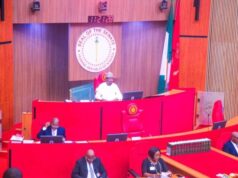The Nigeria Centre for Disease Control and Prevention (NCDC) has urged state governments to invest strategically in health security, workforce retention, and climate-resilient systems to strengthen emergency preparedness.
Speaking in Abuja on Monday, NCDC director-general, Jide Idris, made the call at the unveiling of the state Emergency Preparedness and Response (EPR) Plan, under the federal ministry of health.
The event, attended by state health commissioners, partners, and stakeholders, marked the launch of the EPR Plan, described as a critical roadmap to improve health security across Nigeria’s 36 states and the FCT.
Mr Idris stressed the importance of focusing on high-impact, achievable interventions within available resources to avoid overextension and ensure sustainable progress in public health preparedness at the state level.
He highlighted a significant shortage of skilled health workers at both federal and state levels, saying the NCDC’s own staff strength had dropped from 500 to under 400 due to migration.
He urged states to improve staff welfare and create retention incentives, advising commissioners to lobby governors with compelling arguments on the value of health workers in preparedness and response efforts.
“You must show why these professionals deserve support. Public health workers are the backbone of preparedness and must be protected,” he said.
Mr Idris urged states to prioritise critical actions that delivered quick impact and resilience, noting that resources would follow once foundational systems and capacity were in place.
He also described the new EPR Plan as a strategic agreement between the national and state levels to ensure shared accountability, readiness, and sustained public health protection nationwide.
Borno State health commissioner, Baba Gana, expressed how the 2023 Maiduguri floods submerged the state’s cold-chain facility, displacing more than one million people and disrupting essential health services.
He said the state had now built elevated cold-chain infrastructure and a backup system through its Drugs and Medical Supply Agency to improve disaster resilience and continuity of care delivery.
Mr Gana urged flood-prone states to adopt climate-smart storage models and decentralised stockpiles to reduce vulnerability and improve emergency response in extreme weather events like floods or droughts.
Ogun State health commissioner, Tomi Coker, said the state was addressing workforce shortages by training existing Drug Management System (DMS) staff to manage emergency preparedness supplies.
“This approach allows us to optimise existing staff without hiring new personnel, while ensuring emergency supplies are effectively managed and readily accessible when needed,” she explained.
Banji Filani, chairman of the forum of commissioners for health, and Ekiti State commissioner, called for improved inter-state collaboration in lab systems, surveillance, and knowledge sharing.
“Public health emergencies do not recognise borders. States must support each other. A friend in need is a friend indeed,” Mr Filani said, encouraging joint training and mentorship under NCDC leadership.
(NAN)




